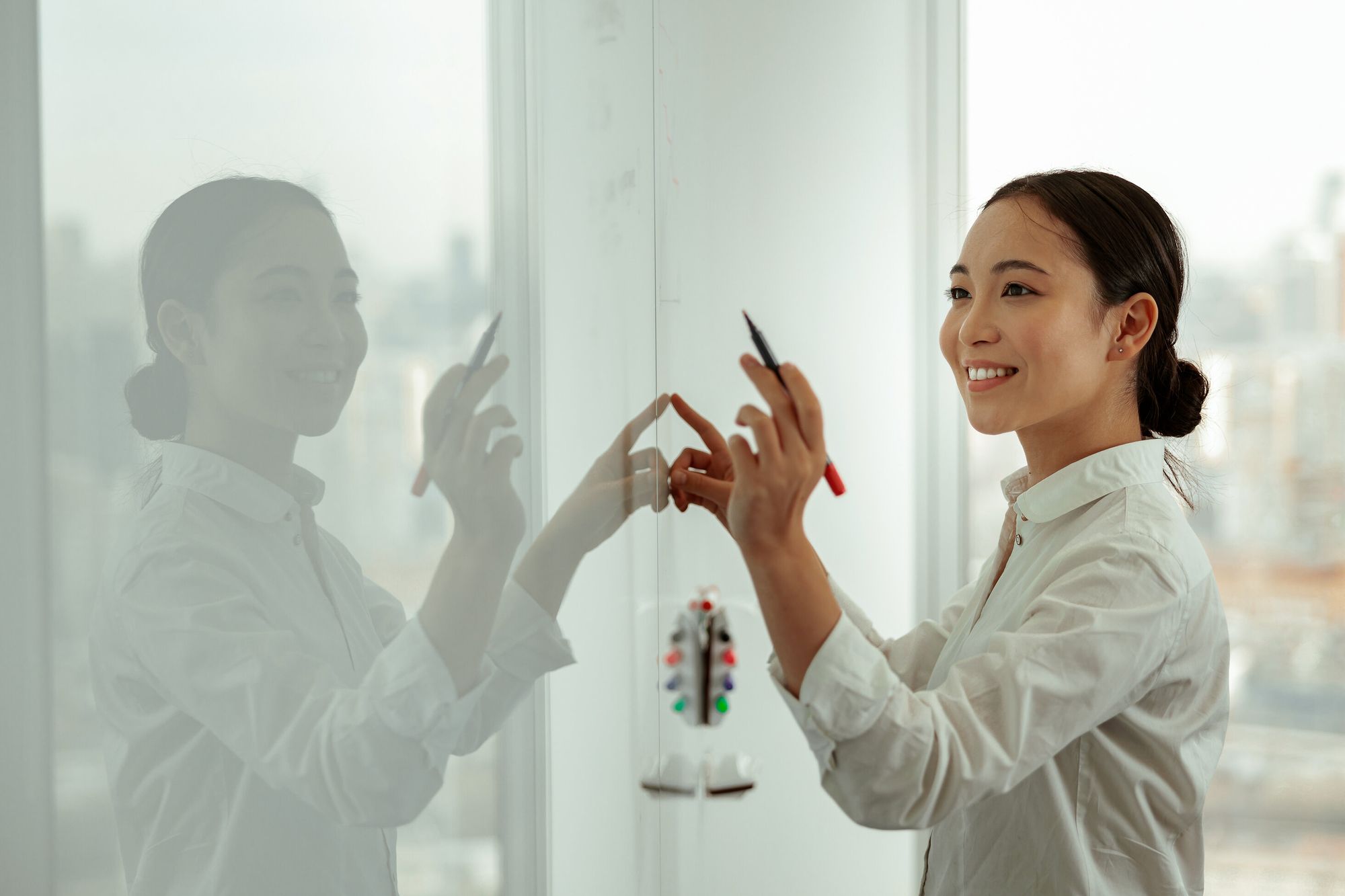
The characteristics and qualities of creative people have been the subject of research and investigation for countless psychologists over the years. Creativity is one of the most useful resources we have as human beings, helping us to innovate, create, solve problems, and dream of bigger and better opportunities.
People who are naturally creative aren’t just artistic or excellent at coming up with new ideas. They also have other distinctive traits which can both help and hinder them in life.
For instance, creative people are often highly energetic individuals, with the ability to look at situations from a range of different perspectives. This makes them fantastic at dealing with challenges using unique, out-of-the-box methodologies.
However, at the same time, an overly active mind can also prompt problems with sleep and relaxation. This is why studies have indicated that creative people often struggle with more sleep disturbances and daytime fatigue than the average person.
Being creative combined with being talented can lead to many amazing entrepreneurial opportunities to monetize your craft and own your own business.
So, what are some of the qualities of creative people, and what are the pros and cons of possessing these qualities?
The Most Common Qualities of Creative People
Every creative person is unique with their own individual traits. We all have our own distinctive characteristics, mindsets, and our unique world views. This means not all of the traits commonly associated with creative people will apply to every creative person. However, psychologists and researchers have discovered some commonalities among creative individuals.
For instance, in a 1996 book by renowned psychologist Mihaly Csikszentmihalyi, the author proposes that creative people have a set of specific traits which interact with each other to promote and enhance creativity. Various studies have also explored the shared characteristics of creative people, highlighting certain recurring traits, such as the ability to recognise other creative works.
Below are 11 of the most common qualities of creative people:
1. Open-Mindedness
Being narrow-minded is not conducive to creativity, but being open-minded is. Creative people need to maintain an open mind, so they can absorb different perspectives, opinions, and ideas, and use them to inspire their own work. People who are open to exploring new things are more willing to explore different ideas, which opens the door for greater discoveries.
Though creative people usually prefer to work alone (more on that in a moment), they also seek out the opinions of others to inform their hypotheses. They’re also more mindful and aware of what’s happening in the world around them, according to some studies.
Most creative people are also more willing to step outside of their comfort zones than others. They’re capable of trying new things and exploring the unknown, while others with a more traditional take on life will likely prefer to stick to routines they know and feel comfortable in.
Being creative requires a certain amount of open-mindedness, alongside a willingness to leave your comfort zone and take risks.
2. Empathetic
Part of being open-minded and mindful as a creative person also involves being sensitive to emotions, thoughts, and experiences. Creative people are often highly empathetic, and capable of understanding the emotions of others, thanks to a strong sense of emotional intelligence. They’re good listeners, and they’re adept at sensing things others might miss.
From one perspective, this high level of sensitivity can help creative people in all aspects of their lives. It makes them more approachable to others, and helps with forming relationships. Plus, sensitivity can increase a creative person’s awareness of the incredible sources of inspiration all around them. This means they’re great at out-of-the-box thinking.
However, the sensitivity of a creative person can also lead to a level of hypervigilance which can be difficult to handle. Being too aware of all the possibilities (both positive and negative) associated with any event or interaction can cause anxiety and stress.

3. Highly Intelligent
Research shows creative people tend to have a high IQ, which is the most common measurement we have of intelligence. While intelligent people aren’t guaranteed to be more creative (personality traits and genetics also play a part), they are more capable of understanding the connections between different concepts which others may overlook.
IQ comes into play when it comes to business acumen as well, which is important if a creative person wants to monetize their craft.
However, a high level of IQ may simply mean creative people are excellent at learning and grasping new ideas, which may mean they’re not as savvy in everyday life. Csikszentmihalyi’s research indicates creative people sometimes look at things in a fresh, childlike, and almost naive manner.
Similar to many qualities of creative people, this characteristic is excellent for maintaining a sense of curiosity and wonder in a creative person, it can also mean they get themselves into difficult or dangerous situations at times.
4. Exceptional Focus and Night Owl Tendencies
While creative people are often seen as having a playful and eccentric attitude, they can also have a high level of focus, discipline, and determination. Because they’re passionate about what they do in life, whether it’s woodworking, painting or writing, creative people tend to become honed in on certain pieces of work. This means they’re more likely to finish tasks on time, and keep pushing forward through challenging or difficult periods.
However, when working on a project with a high level of passion and determination, many creative people can often forget how to switch off. It’s not uncommon for artists and creatives to work well into the night, which makes it difficult to get a good night’s sleep.
Another one of the common qualities of creative people is the quality of being a night owl.
Many creative people struggle to disconnect from their work and maintain a solid level of balance when it comes to self-care and wellbeing. Staying up too late factors into this.
It’s understandable if you’re a creative individual who is trying to finish making a product, you’d want to stay focused and stay up until the item or product you’re creating is finished. Just try not to stay awake too late, because if you start staying up until the sun is rising, your circadian rhythm will be out of whack.

5. High Energy
One of the qualities of creative people is energy. Sometimes this is internalized energy, such as constantly thinking of new ideas or avenues. Other times this is physical energy, such as the ability to do woodworking in your studio for 9 hours straight.
Many creative people are often extremely energetic individuals, with minds working at the speed of light to solve problems and come up with new ideas. This high level of energy is excellent for working on projects according to a strict deadline, and staying focused on tasks.
Of course, high levels of energy can also have their downsides, including a consistent sense of restlessness.
Having an overactive mind can often make someone feel like they can’t relax or switch their brain off.
Creativity is often linked to a number of mood disorders, because creative people often find themselves becoming bored, restless, and overly “hyperactive” at times.
In routine and mundane work, creative people struggle to thrive, and their mind begins to wander, hampering their productivity and concentration levels. Because of this, creative people need to ensure they’re constantly imagining and creating to feel happy.
6. Ambition
Studies have shown that creativity is constantly linked to ambition, even for people with mood and cognitive disorders. Many creative people are excellent at imagining a future where they can achieve their goals and discover new things, so they aim high with their work.
They also understand the perfect solution to a problem doesn’t always come easily, so they’re willing to work consistently to reach their goals, pushing through common challenges. When creative people have a passion for something, their hyper-focused nature allows them to visualize and achieve their goals in most circumstances.
One of the downsides of this ambition is many creative people are also quite modest. While they know the amount of work that goes into producing whatever they make, they also find it difficult to be fully satisfied with anything they’ve done. This can lead to issues such as “imposter syndrome” when a creative professional actually reaches their goal.
7. Bravery and Fearlessness
To achieve something incredible, we often have to take risks. Coming up with new ideas, and exploring new avenues means pushing beyond your comfort zone, and exposing yourself to the unknown. For most people, the “unknown” is a terrifying concept, but for creative people, it’s a landscape worth exploring. Creatives understand what could be in store for them if they take the leap.
When assessing the qualities of creative people, scientists often define creatives as risk takers, as they’re willing to test new hypotheses and strategies consistently, even if they’re met with failure. They’re willing to learn from their mistakes, and use every experience as an opportunity for growth.
While being able to take risks is important for success in life, it can also be a source of significant stress and turmoil for creative minds. If risks continue to lead to failure for too long, a creative person may begin to lose their confidence.
8. Rebellion
Countless reports have shown creative people have the most rebellious mindsets. To be a creative person, you need to be willing to constantly ask “Why”, and question how different things are done. Only when you begin to look more closely at the status quo, can you start to come up with new ways of accomplishing your goals.
Many experts believe it’s impossible to be truly creative without first being willing to ignore many cultural norms and traditions. While this rebellious nature is excellent for fostering a creative person’s sense of independence and growth, it can also be the cause of numerous problems. A creative person’s rebellious mindset may make them seem odd and eccentric to others.
Additionally, throwing off traditional norms means creative people are often less likely to adhere to the standards of other people. They may have messier homes and appearances, because they’re less worried about making the right impression, and more concerned about achieving their goals.
9. Emotional
A common quality of creative people is a high connection to emotions. It’s common for emotions to be running high among creatives.
Creativity and emotions are often linked. Positive emotions such as happiness and passion can often spur creative people to accomplish their goals. However, creative individuals can also be inspired by other, more negative emotions as well.
Just think of all the artists and writers throughout the years who have produced their best work after a period of turmoil or after experiencing a trauma. Tapping into those intense emotions – even the negative ones – can lead to some truly amazing work in terms of art, writing, songs, etc.
Highly creative people tend to lead with their heart, rather than their head. They often don’t follow the rules of logic in the same way as others, and they’re more driven by their feelings than most. This can lead to the creation of incredible pieces of art and content, which connect with other people on a deeper level. However, it can also mean creative people are prone to emotional struggles.
One report found artists tend to have more anxiety than other people, and many often suffer from depression and stress.
10. Less ‘Tidy’ and Less ‘Traditional’
You might have heard that one of the common qualities of creative people is to be a little ‘messy’ around the house. Is this because being too clean, tidy and organized makes creatives feel too conventional or traditional?
Researcher Kathleen Vohs told Science Daily, “‘Disorderly environments seem to inspire breaking free of tradition, which can produce fresh insights,” and continued to explain, “Orderly environments, in contrast, encourage convention and playing it safe.’
In other words, being in a messy environment symbolizes freeing oneself from conventional, traditional and ‘boring’ mindsets.
If you’re a creative person who tends to be messy, you’re not alone. However, if the mess around you is starting to wear on you, you may want to learn how to be more organized and tidy. Check out this article on Marie Kondo’s life-changing magic of tidying up.
11. Fiercely Independent
One of the top qualities of creative people is independence, as it allows them to break free from the rules and constricts which might otherwise hamper their creative flow. Working independently provides creative people with the freedom they need to truly explore their own ideas and imagination.
Since creative people often have a talent or craft such as woodworking, sculpting, painting, writing or some other form of ‘creating’, they often work on their creative projects alone.
Many creative people prefer to work in an isolated environment, rather than being constantly surrounded by other people who might challenge their mindset or distract them from their craft. What’s more, creative people are very self-sufficient, they don’t need to rely on other people to solve their problems for them, as they see challenges as opportunities to grow.
Creative people can more easily be independent and focused on their craft, rather than codependent and focused on a relationship.
This independence can be a fantastic tool for creative people, as it allows them to be more emotionally strong and focused. However, it could also mean some creative people end up isolating themselves more often. Indeed, creativity is often connected with loneliness.
Understanding the Characteristics and Qualities of Creative People
The qualities of creative people can differ from one individual to the next. Our genetics, upbringing, and personality all influence our character just as much as our creative nature. However, if you’re a creative individual, you might find many of the qualities above resonate with you.
While most of the points associated with creative people above have their benefits, they can also have their downsides as well. Creative people are excellent at viewing the world from a new perspective, but their unique nature can cause them to struggle with everything from sleep to too much isolation.
Do You Have the ‘Creativity Gene’?
Being a creative person is partly genetic. Being artistic, for example, often runs in the family. In general, creativity is a quality that you can be more or less likely to have depending on what’s written in your DNA.
Find out if you’re more likely to be creative, entrepreneurial, and more by taking a CircleDNA test and reading about your genetic success traits.







Comments are closed.